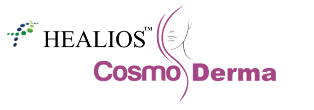What is aciclovir?
Aciclovir is the most widely prescribed antiviral drug in the world. It was first available on prescription in 1983.
Aciclovir is a synthetic compound with a similar molecular structure to purine nucleoside. It has been shown to stop the growth of herpes simplex virus (HSV), Varicella zoster virus (VZV) (the cause of chickenpox and shingles), Epstein–Barr Virus (EBV, the cause of glandular fever), and to a lesser extent Cytomegalovirus (CMV).
Indications for treatment with aciclovir
Aciclovir is used in the treatment of:
- Primary herpes simplex
- Recurrent episodes of genital herpes
- Suppression of HSV infections
- The first few days of herpes zoster infections
Dosing regimes for aciclovir
Herpes simplex
- For an initial outbreak in adults and children over 2 years, oral aciclovir 200 mg, or 400 mg three times daily, should be taken five times a day for 10 days. Half the adult dose should be used for children under 2 years.
- For recurrent episodes, treatment should be started at the earliest sign and continued for 5 days.
- If long term suppressive therapy is necessary, 400 mg is given twice daily.
Aciclovir is also available as a cold-sore cream for the lips and face, and as an ophthalmic ointment for eye infections. It should be applied at the first sign of recurrent infection, often a tingling feeling. It is then rubbed into the affected area every four hours during waking hours for 5 days. It is not suitable to use inside the mouth or other mucous membranes.
Varicella zoster
Aciclovir is an important treatment for herpes zoster (shingles) but it can also be used to treat varicella (chickenpox) in adults, or severe infections in children.
Best results are achieved if the treatment begins within 48 hours of the onset of the rash. Oral aciclovir 800 mg five times a day for 7 days accelerates the rate of healing of blisters. In zoster infections, it also reduces the severity and duration of pain, and may prevent post-herpetic neuralgia.
Intravenous aciclovir achieves higher blood levels compared to oral aciclovir. It is recommended for severe infections:
- Immunocompromised patients with chickenpox, disseminated herpes zoster or severe herpes simplex
- Acute herpes zoster when it affects the trigeminal nerve (forehead and eyelids)
- Extensive eczema herpeticum
- Herpes infection of the brain (encephalitis)
- Herpes infections in newborn babies.
Intravenous aciclovir is given over 1 hour every 8 hours for 7 days in a dose of 5 mg/kg for HSV and 10 mg/kg for VZV.
Mechanism of action of aciclovir
To become effective, aciclovir must first be changed to aciclovir monophosphate by an enzyme that is only found in viruses, called thymidine kinase (TK). It is then converted to its active triphosphate form by human enzymes found inside the cells.
CMV does not produce thymidine kinase so the antiviral activity of aciclovir in CMV infections is poor.
Aciclovir triphosphate (AT) is the active form of the drug. It reduces production of viral DNA by competing with a natural compound, deoxyguanosine triphosphate, for the viral DNA polymerase enzyme. Incorporation of AT into the viral DNA completely prevents the synthesis of new DNA.
Viral DNA polymerase binds 10–30 times more strongly to AT than the cellular DNA polymerase. This means aciclovir is not toxic.
Unfortunately, only about 15–20% of the dose of aciclovir is absorbed through the gut wall, which means it must be taken frequently as it only active for two or three hours in the blood stream.
Side effects of aciclovir
Side effects are uncommon from aciclovir, but include: nausea or vomiting, diarrhoea, headache, fever, confusion, lymphadenopathy, generalised muscle aches and itchy skin.
Aciclovir should be used with caution in patients with kidney disease. The dose should be reduced to prevent accumulation of the drug and to decrease the risk that the drug will damage the kidneys or the nervous system. Aciclovir can also cause abnormal liver function blood tests, and rarely, a lowering of the white cell count.
A pregnancy registry of more than 1000 women who received aciclovir before or during early pregnancy showed no increased rates of miscarriage or birth defects in offspring. However, as with any medicine, it should only be given in pregnancy if the benefits are believed to outweigh the risk.
Other antiviral agents used in herpes infections
Valaciclovir is a prodrug of aciclovir and has better bioavailability. It can also be used to treat HSV and HZV. It is used to prevent CMV infection following organ transplant. Usual doses are:
- HZV: 1 g three times daily for 7 days
- HSV: 500 mg twice daily for 5 days
Famciclovir is used for HSV and HZV. The usual doses are:
- HZV: 500 mg three times daily for 10 days
- HSV: 125–250 mg three times daily for 5 days
- Suppression longterm: 250 mg twice daily
- Recurrent HSV of lips: single dose of 500 mg at first signs of blistering
- Recurrent genital HSV: 100 mg twice daily for 1 day at first signs of blistering

 7975288129 / 7483528607
7975288129 / 7483528607
